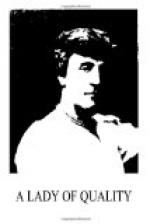“Your ladyship has made of me a happier man than I ever dared to dream of being, even when I was but thirty,” he would say to her, with reverent devotion. “I know not what I have done to deserve this late summer which hath been given me.”
“When I consented to be your wife,” she answered once, “I swore to myself that I would make one for you;” and she crossed the hearth to where he sat—she was attired in all her splendour for a Court ball, and starred with jewels—bent over his chair and placed a kiss upon his grizzled hair.
Upon the night before her wedding with him, her sister, Mistress Anne, had stolen to her chamber at a late hour. When she had knocked upon the door, and had been commanded to enter, she had come in, and closing the door behind her, had stood leaning against it, looking before her, with her eyes wide with agitation and her poor face almost grey.
All the tapers for which places could be found had been gathered together, and the room was a blaze of light. In the midst of it, before her mirror, Clorinda stood attired in her bridal splendour of white satin and flowing rich lace, a diamond crescent on her head, sparks of light flaming from every point of her raiment. When she caught sight of Anne’s reflection in the glass before her, she turned and stood staring at her in wonder.
“What—nay, what is this?” she cried. “What do you come for? On my soul, you come for something—or you have gone mad.”
Anne started forward, trembling, her hands clasped upon her breast, and fell at her feet with sobs.
“Yes, yes,” she gasped, “I came—for something—to speak—to pray you—! Sister—Clorinda, have patience with me—till my courage comes again!” and she clutched her robe.
Something which came nigh to being a shudder passed through Mistress Clorinda’s frame; but it was gone in a second, and she touched Anne—though not ungently—with her foot, withdrawing her robe.
“Do not stain it with your tears,” she said “’twould be a bad omen.”
Anne buried her face in her hands and knelt so before her.




